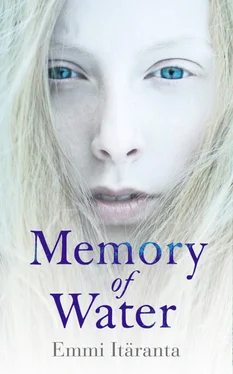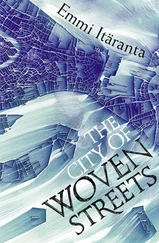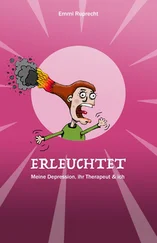The thought broke and blurred and slipped away.
I was here, and nothing could change what I saw.
Branches were swinging in the breeze; light coloured the dense, dark-green mesh of the grass, where stalks knotted into uneven tangles. The only shadow cast on the ground was mine, and in the quiet of the morning I could discern no sounds of footsteps or breathing, no words carried in the wind. I walked to the door and touched the circle. Some paint came off to my fingertips. I wiped the sticky colour on my trousers, and the fabric was stained by three blue streaks. I knew they would be impossible to wash off. The thought left me indifferent.
The floorboards creaked when I stepped into the house. My throat was sand-dry; it hurt to swallow. I stopped in the kitchen, turned the tap on and remembered at once that I had gone to the fell to close the pipe two days earlier. There wouldn’t be any water.
There was water.
I filled a teacup and drained it. I drank another cupful, then one more. The water didn’t stop running. I recognised the taste: it was coming from the spring in the fell. I turned the tap off, then turned it on again. There was still water.
The metal was cold and even under my fingers. I turned the tap off, sat down on the kitchen floor with my legs bent and pressed my forehead into my knees.
I listened to my own breathing. I listened to the movement of blood in my veins. I listened to the silence of the house and tried to understand what had happened.
Faces of villagers surfaced in my mind, requests and words of gratitude on cracked lips, hands lifting full waterskins, their bones ashen fans under the taut skin. Their footsteps heavy-pressed on the ground, when they carried the weight under their clothes that the life of their children or spouses or parents depended on. One of them had entered my house, sat in my kitchen and taken home my water – only water, I corrected in my mind, not my water. Upon returning to the village, they had looked at the posters along the streets, the award sum painted on them. And after days or weeks, footsteps steady or staggering, they had walked to the guard on the street. Said, I’ve got something to tell that might interest you.
How long had the military known?
Had they been following my movements and my travel preparations, did they know about the helicarriage and the fake passpods? Maybe they had known about the spring for weeks already, but had found out somehow that I was going to leave the village, and they had waited. Perhaps they had been keeping watch on the hiding place of the helicarriage, monitoring how Sanja and I carried food and water there. And yesterday, when Sanja had walked along the edge of the plastic grave to wait for me, they had stepped out in the open, three soldiers in their heavy boots and blue uniforms, perhaps only two – just one would have sufficed, because Sanja was not of large build. I could see them blocking her way at the entrance of the underbelly of the bridge below the dark-hanging sky and drawing their sabres from their sheaths. Rain blurred the blades into a blistering mirror surface. One of the soldiers tied her hands behind her back while the other strode into the space under the bridge, where the helicarriage was waiting, ready to go. They took the carriage and the food and water laden into the cart, and drove her away, and she had no way of escaping or contacting me.
I tried not to imagine what had happened to Sanja.
Under all my thoughts I knew that there was another possibility. That she had not been captured. That the soldiers had not needed to come to her.
But I couldn’t think of this. It would not fit within my bounds without shattering them.
I thought of everything I knew about the events at other water crime houses in the village. There wasn’t much: rumours, hearsay. Uncertain glimpses of prisoners, distant and quiet as ghosts. Dried blood on the sand of the garden path.
There was an instant of hollow terror when I realised I might not be able to leave the house, but then I remembered I had already been outside with no consequences. I had no idea how far from the house I could stray. And what would happen when I reached this invisible boundary drawn around my life? Would I be shot dead on the spot, or would a warning be enough?
There was only one way to find out.
My legs were shaking when I stepped out to the veranda.
The path from the front door of the house to the gate was as familiar and commonplace to me as the back of my own hand. I had walked the route countless times, on most days of my life, and I could have described its shape with my eyes closed. Yet now the journey across the grass was strange and new, the arch of each step bright-cut and each movement of the centre of my body as heavy as an uprooted rock. I saw a moth caught in a cobweb under the eaves where I hadn’t seen it the day before. I saw the ripples of the stone slabs, the unevenly slated shape of their edges, the metal-dark layers of the mineral, squeezed against each other by time. I saw my own foot, made of brittle bone and thin skin, which spread pale and vulnerable on the shield of stone in the soft frame of grass-stalks.
Breath passed in me hastily, raggedly, and on each step I expected to feel somewhere in my body – what, exactly? I had seen bullet wounds, bandages tarnished by dry blood and sticky, yellow liquid around them, but I had never seen a bullet find its way to its victim. I had not seen the pain on the face of a person, when metal penetrated their skin and tore their tissues apart and sank into bone. I imagined a stinging, burning agony, like a small explosion in my flesh, and then I tried to imagine the same pain hundredfold, because I was certain my first thought was nowhere near reality. How much would I realise? Would I have time to follow as life slowly left me, or would it all be over so quickly that the screeching pain caused by the wound would barely cut to my consciousness?
Blood weighed in my feet as I forced myself to take one step after another. Grass-stalks fell back under the soles of my shoes and straightened towards the sky again as my feet rose from them.
Something rustled in the direction of the forest. I didn’t see movement among the trees. I realised I had stopped. My breathing sang, stuck in my tense throat. I relaxed my muscles and let the air out of my lungs into the crisp morning that smelled of last night’s rain. The gate wasn’t far away now. A step: in a few long strides I would reach it. A step, another one and another: I could touch the night-chilled metal of the gate if I reached out my arm. A final step: I was standing right in front of the gate.
Leaves swished against each other and wind tugged at the branches. Shadows changed on the sand of the road. The windchime hanging from the pine tree tinkled softly behind me.
I took a breath, closed my eyes and opened the gate.
Nothing happened.
I looked around and still didn’t see anything suggesting another person’s presence.
I took a step through the gate.
Then a second one.
On the third step a sharp but surprisingly faint bang cut the air, as if a thick plank had been split in two with one metallic stroke. A fistful of sand shot into the air only a couple of finger-widths away from my toes. I froze. The echo of the bang faded into the landscape.
As a child I would wrap myself inside a curtain in the corner of my mother’s study and hide in there during thunderstorms, in the soothing, soft dusk where light sieved through the texture of the fabric. I would wait until the menacing cracks in the world sealed and faded away, and it was safe again to walk in the house without the shelter provided by the curtain. Now the same impulse struck through me. Every fibre in my body screamed that I should turn around and run into the house as fast as my feet would take me, curl into the corner inside the curtain, until the cracks of the world would be closed again, and I couldn’t slip through them into the tight-entwined darkness or too-white, all-scorching light. But the curtain had frayed on the edges ages ago, the corner was full of cobwebs and knotted dust, and there was no place left in the house or garden or fell where I could have escaped the cracked-open, glass-edged crevices of the world.
Читать дальше
Конец ознакомительного отрывка
Купить книгу












